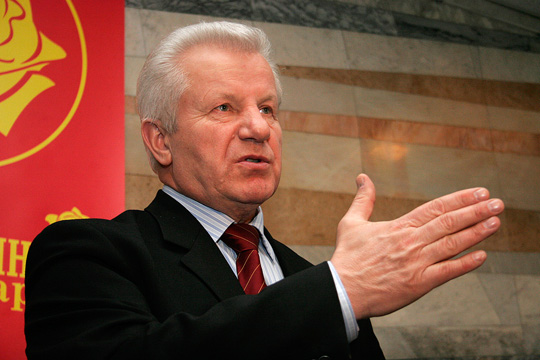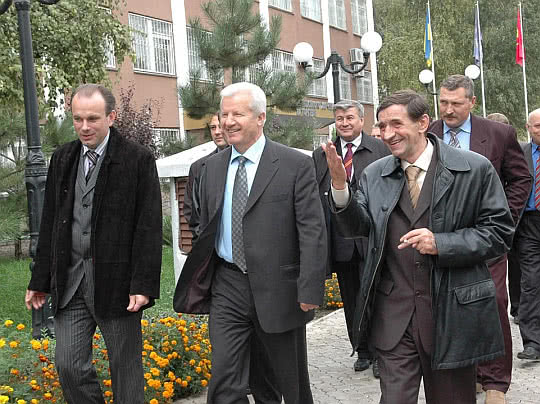Socialist Party of Ukraine
Socialist Party of Ukraine (Соціалістична партія України; Sotsialistychna partiia Ukrainy, or СПУ; SPU). Contemporary Ukrainian political party. After the banning of the Communist Party of Ukraine (CPU) in August 1991 in the wake of the failed coup against Mikhail Gorbachev in Moscow, a contingent of communists gathered in Kyiv on 26 October 1991 to found the Socialist Party of Ukraine. Despite its designation, the latter is a genuine successor to the Soviet-era CPU whose name legally could not be resurrected at the time. The leader of the SPU since then, and until his resignation in 2012, was Oleksandr Moroz. On 1 January 1995, the party had 29,233 members, and some 34,000 in 2000, making it one of the largest in Ukrainian politics at that time.
While critical of the Soviet party-state bureaucracy for allowing its interests to prevail over those of society, the party’s program nonetheless condemns the USSR’s dissolution as having been unconstitutional. It also distinguishes itself from its predecessor by stressing the importance and centrality of the individual as against society—a just, socialist society, it maintains, makes realization of full individuality possible. Otherwise, the SPU is the direct continuator of the policies of the Communist Party of Ukraine of Soviet times with its emphasis on the priority of labor and of the state sector in the economy. It believes in a socialist, state-dominant economy and an egalitarian society; the ‘socialist choice’ is still valid, according to the party. In its orientation to the post-communist regime, it is anti-presidential and anti-reform, and correspondingly pro-labor and pro-trade union.
The SPU had at least 10 deputies in the Supreme Council of Ukraine up to 1994 as well as a caucus (fraction) that grew from 25 to 40 deputies in the 1994–8 parliament. In the 1998 elections the SPU campaigned together with the Peasant Party of Ukraine under the banner ‘For Truth, For the People, For Ukraine!’ Their joint platform characterized the regime of President Leonid Kuchma as bandit rule (bandokratiia) and offered to restore ‘Ukraine as an economically powerful, democratic, and socially just state which serves its own people, and every one of its citizens,’ rather than the personal interests of its political leaders. The aims of the Socialist-Peasant bloc were: to halt the economic crisis; to revive production (whether of the Soviet era or not was unclear); to regulate markets and prices; to raise the population’s purchasing power; to curtail the influence of foreign financial institutions; and to de-statize (but not to privatize) property in order to ensure production, employment, and budgetary revenue. In the agricultural realm, the two parties would: make it the priority sector of the economy by increasing investment and changing price and credit policies; support large-scale production; halt imports while increasing state orders for wheat, sugar beets, sunflower seeds, and flax; facilitate exports to the countries of the Commonwealth of Independent States (CIS); and never allow land to be bought or sold. The platform promised to raise wages and salaries to assure people a decent living standard. It also promised to eliminate crime and corruption. In foreign policy, Ukraine would never be allowed to become an adjunct of NATO. These two parties were committed to: renationalizing industrial enterprises that form the basis of the (smokestack) economy; developing agriculture by restoring full state protectionism and providing social guarantees for its labor force; reclaiming the proceeds of criminal gains deposited in foreign bank accounts; and bringing to justice all who have brought ruin upon the country.
The Socialist-Peasant bloc nominated 201 candidates for its party list and elected 29 by obtaining 8.6 per cent of the vote; 3 additional Socialist deputies were elected in single-member districts, along with 2 representatives of the Peasant Party of Ukraine, which made for a total of 34, the third-largest contingent by a party or electoral bloc. After the elections, Oleksandr Moroz voiced concerns about the party being in the shadow of the Communist Party of Ukraine and called for its rejuvenation with younger members as well as its liberation from the shackle of Marxist-Leninist dogmas. At the end of 1998, the parliamentary caucus (fraction) of the socialist-peasant bloc (known as the ‘left center’), led by Moroz, contained 25 deputies; the Peasants had split off on 1 October 1998 to form their own caucus of 14 deputies led by Serhii Dovhan. Dovhan was said to be a Leonid Kuchma plant meant to draw the rural vote away from Moroz, the president’s principal foe. When Moroz ran third in the 1999 presidential election, the same placement as in 1994, there was further internal dissatisfaction and some defections. It was felt that the party was less well-known than its leader, that it had become overly identified with the Ukrainian village, and that there was a need for renewal.
It was Oleksandr Moroz who released the damaging Heorhii Gongadze tapes and who subsequently campaigned for the impeachment of President Leonid Kuchma. The SPU believed that under Kuchma the country was moving into pauperization and totalitarianism. The party published the newspapers Tovarysh and Za vil'nu Ukraïnu. On 13 June 2001 its parliamentary fraction consisted of 16 deputies.
In the 2002 elections, the SPU offered voters honest government and a better life. In particular, it promised to bring government under popular control, to create one million new jobs, to provide more state support for rural areas and to ban the sale of land, to introduce a flat tax for businesses, to lower the costs of communal services, to raise teachers’ salaries as well as family allowances, and to return lost bank savings. As was its practice, the Leonid Kuchma regime sponsored a clone All-Ukrainian Party of Workers, led by another Oleksandr Moroz, to draw away votes from the SPU. The real Socialists obtained fifth place with 6.9 per cent of the PR vote, for 20 seats, with an additional two in SMDs, for a net loss of 12 seats; the fake rival managed just 0.3 per cent.
In the wake of the Orange Revolution, the SPU saw a further decline in its popularity but a gain in standing by overtaking the Communist Party of Ukraine. Promoting itself as a European-style social democratic party, it offered to ‘build Europe in Ukraine.’ It promised honest government, self-reliance, and support for small and medium-sized business. It would bring in: price controls; limits on utilities charges; increased incomes, pensions, and stipends; one million new jobs annually; free education and medical care; reform of law enforcement, courts, and local self-government; and EU-style subsidies for agriculture. A referendum on NATO was also on offer. ‘The aim of the Socialists,’ said its pre-election program, ‘is social justice, well-being of every family, and a strong, democratic, and sovereign state. This is how we view democratic socialism and Ukraine’s European choice.’ On election day, 26 March 2006, the Socialists garnered 5.7 percent of the vote, a drop of 1.2 percentage points, but increased their seat count by 11 to 33 due to the change in electoral system (from mixed to straight PR). This placed them behind Our Ukraine and ahead of the CPU.
Contrary to a written agreement that his party would form a governing coalition together with the Orange forces of Viktor Yushchenko and Yuliia Tymoshenko, Moroz defected with most of his caucus to join the Party of Regions and Communist fractions in an ‘anti-crisis coalition.’ He thus became chair of the Supreme Council of Ukraine again. This politically and morally shocking switch cost the Socialist Party dearly in the next elections in 2007. For its program in that contest the SPU completely abandoned its European social democratic stance. It offered instead vague generalities about guaranteeing political reform, industrial development, support for agriculture, increased well-being, strengthening law and order, security, transparency, return of savings, and normalization of relations with both the Russian Federation and the European Union. In consequence of its increasing irrelevance, the party obtained just 2.9 per cent of the vote, which was below the threshold of representation, and lost all 33 of its seats from the previous convocation of the Supreme Council of Ukraine.
Subsequently, the SPU’s share of the vote dropped to a miniscule 0.5 per cent in the 2012 elections; it did not contest the 2014 race called shortly after the Euromaidan Revolution, when the Supreme Council of Ukraine underwent a fundamental change in its political party composition.
In 2012, Oleksandr Moroz unexpectedly acknowledged that abandoning his Orange comrades for the Party of Regions and the CPU six years earlier had been a mistake. So after twenty years he also stepped down as SPU leader; but then in July 2016 he became head of an eponymous Socialist Party of Oleksandr Moroz, under which banner he registered as candidate for president in 2019, withdrawing from the contest on the very eve.
After Oleksandr Moroz, leadership of the SPU passed through several hands—Petro Ustenko, Mykola Rudkovsky, and Mykola Sadovy—until in July 2017, Illia Kyva, a Ministry of Internal Affairs colonel once convicted of bribery and a Right Sector leader, became its head. The legitimacy of this appointment, however, was challenged in court by Serhii Kaplin who claimed to be the rightful leader. A new party program was adopted in 2018, the contents aptly summed up in its title: ‘A Strong Country. Social Justice. Law and Order.’ Declaring its nostalgia for the USSR finally exhausted, the party set course for integration into the European Union and entry into NATO. In 2019, Kyva, representing the SPU, was one of 39 candidates for the presidency and obtained 0.03 per cent of the vote; in the parliamentary elections, he acquired a seat, but as no. 34 in the Opposition Platform—For Life Party’s list. The latter, actually an electoral alliance or bloc, promoted a program which would undo all de-communization, lustration, and Ukrainianization policies, redo the Ukraine-EU Association Agreement, and restore trade with the countries of the Commonwealth of Independent States. By directly negotiating with the so-called ‘Donetsk People’s Republic’ and ‘Lukansk People’s Republic,’ it would end the war in the Donets Basin. How such aims could be squared with social democracy and sovereignty was a puzzle. At present (2020) it is clear that what is left of Oleksandr Moroz’s Socialist Party of Ukraine—able neither to promote continuing with the social security of Soviet socialism nor to transform itself into a genuinely European social democratic party—has exhausted its political relevance.
Bohdan Harasymiw
[This article was written in 2020.]


